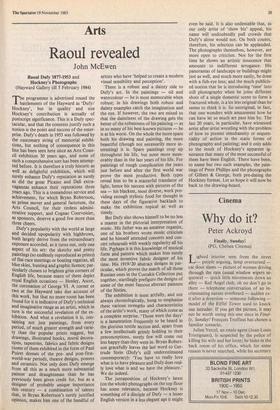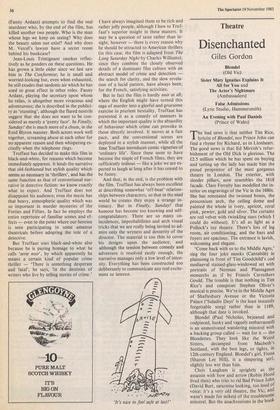Cinema
Why do it?
Peter Ac kr o yd
Finally, Sunday! (PG, Chelsea Cinema)
Lighted interior seen from the street people arguing, lamp overturned — car door slams — picture of woman driving through the rain (usual window wipers se- quence) — quick little movements down an alley — Red Angel club, oh no don't go in there — telephone conversation of an in- criminating nature overheard — sudden ex- it after a diversion — someone following — model of the Eiffel Tower used to knock out intruder. If you get the picture, it may not be worth seeing this one since in Final- ly, Sunday! Francois Truffaut has chosen a familiar scenario.
Julien Vercel, an estate agent (Jean-Louis Trintignant), is suspected by the police of killing his wife and her lover; he hides in the back room of his office, which for some reason is never searched, while his secretary (Fanny Ardant) attempts to find the real murderer who, by the end of the film, has killed another two people. Who is the man whose legs we keep on seeing? Why does the beauty salon not exist? And why does M. Vercel's lawyer have a secret room behind his bookcase?
Jean-Louis Trintignant smokes reflec- tively as he ponders on these questions. He has grown a little older since we last saw him in The Conformist; he is small and worried-looking but, even when exhausted, he still exudes that sardonic air which he has used to great effect in other roles. Fanny Ardant, playing the secretary upon whom he relies, is altogether more vivacious and adventurous; she is described in the publici- ty as 'stunning', although the flared nostrils suggest that she does not want to be con- sidered as merely a 'pretty face'. In Finally, Sunday! she is much more of a chum, in the Enid Blyton manner. Both actors work well together, screaming abuse at each other for no apparent reason and then whispering ex- citedly when the telephone rings.
Truffaut has decided to make this film in black-and-white, for reasons which become immediately apparent. It lends the narrative that old-fashioned but stylish quality which seems so necessary in 'thrillers', and has the same function as that of conventional nar- rative in detective fiction: we know exactly what to expect. And Truffaut does not disappoint his audience; even the music has that heavy, atmospheric quality which was so important in murder mysteries of the Forties and Fifties. In fact he employs the entire repertoire of familiar scenes and ef- fects — even to the point where our heroine is seen participating in some amateur theatricals before adopting the role of a detective.
But Truffaut uses black-and-white also because he is paying homage to what he calls `serie noir', by which apparently he means a certain kind of popular crime thriller — 'There is something desperate and fatal', he says, 'in the destinies of writers who live by telling stories of crime.' I have always imagined them to be rich and rather jolly people, although I bow to Truf- faut's superior insight in these matters. It may be a question of taste rather than in- sight, however — there is every reason why he should be attracted to American thrillers (in this case, the film is adapted from The Long Saturday Night by Charles Williams), since they combine the closely observed details of a dominant film culture with an abstract model of crime and detection the search for clarity, and the slow revela- tion of a lucid pattern, have always been, for the French, satisfying activities.
But in fact the film is hardly noir at all; where the English might have turned this saga of murder into a gleeful and gruesome exercise in prurient bestiality, Truffaut has presented it as a comedy of manners in which the important quality is the absurdity of behaviour which crime can provoke in those directly involved. it moves at a fast pace, and the conventional scenes are deployed in a stylish manner, while all the time Truffaut introduces comic vignettes of 'ordinary life'. Since these seem to have become the staple of French films, they are sufficiently tedious — like a joke we are ex- pected to laugh at long after it has ceased to be funny.
And that, in the end, is the problem with the film. Truffaut has always been excellent at describing somewhat 'off-beat' relation- ships between characters, so that in the mad world he creates they enjoy a strange in- timacy. But in Finally, Sunday! that humour has become too knowing and self- congratulatory. There are so many co- incidences, improbabilities and arch visual tricks that we are really being invited to ad- mire only the wryness and dexterity of the director. The material is too thin to cover his designs upon the audience, and although the tension between comedy and adventure is resolved easily enough, the narrative manages only a low level of inten- sity. Everything has been constructed too deliberately to communicate any real excite- ment or interest.



























































 Previous page
Previous page